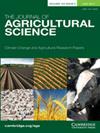Effects of Intercropping on Maize and Soybean Yield Performance, Land Equivalent Ratio, and Maize Leaf Area in Conservation Agriculture
IF 2.2
4区 农林科学
Q2 AGRICULTURE, MULTIDISCIPLINARY
引用次数: 0
Abstract
Maize-soybean intercropping systems as a conservation farming practice are receiving increased focus from the scientific community. This is because of the advantages of intercropping, especially nutrient benefits through cereal-legume interactions, alternative sustainable methods to manage biotic stress (pests, diseases, weeds), and crop failure risk management due to erratic weather. In addition, smallholders in developing countries commonly use intercropping to produce crops. In Uganda, 40% of smallholder farmers are practicing intercropping yet no adequate location-specific information is available to inform their practice. Farmers who adopted conservation farming practices did not mulch their maize due to drudgery associated with collecting mulch. This study evaluated the effect of two tillage methods (T1 = Conventional tillage using ox drawn mould board plough, T2 = Minimum tillage using ox drawn ripper) and five soil cover practices (SC1 = Mulched Maize, SC2 = Control no mulch, SC3 = Two rows of soybean in between one row of maize, SC4 = One row of soybean in between one row of maize, SC5 = Sole soybean) on maize and soybean yield performance. The trials were established for 4 rainy seasons on a sandy loam ferrosol at National Agricultural Research Organization Institute in Lira, Uganda. Soil cover practice had a significant effect on maize and soybean crop Yield. Mulching significantly increased maize yield and LAI. The LER for both intercropping partterns were above 1.2. Tillage methods were not significantly different in determining crop performance. The practice of minimum tillage should also be adopted because it enhances the positive effects of soil cover (intercropping). We recommend farmers to adopt the intercropping pattern of one row of soybean in between maize row spaced at 75 × 30 cm for better LER, and crop performance. This intercropping pattern maximizes on available resources to deliver better output in conservation farming. Maize crop generally performed better during first season as compared to second season. We recommend farmers to utilize the first rains as the main maize production season.保护性耕作中间作对玉米和大豆产量表现、土地当量比和玉米叶面积的影响
作为一种保护性耕作法,玉米-大豆间作系统正受到科学界越来越多的关注。这是因为间作的优势,特别是通过谷物与豆类的相互作用产生的养分效益、管理生物压力(虫害、疾病、杂草)的替代性可持续方法,以及因天气变化无常而导致的作物歉收风险管理。此外,发展中国家的小农户通常使用间作方法生产作物。在乌干达,40% 的小农户采用间作方法,但没有足够的针对具体地点的信息来指导他们的做法。采用保护性耕作法的农民不会对玉米进行覆膜,因为收集覆膜很费力。本研究评估了两种耕作方法(T1 = 使用牛拉模板犁的传统耕作法,T2 = 使用牛拉开沟器的少耕法)和五种土壤覆盖方法(SC1 = 玉米覆膜,SC2 = 无覆膜对照,SC3 = 一行玉米间两行大豆,SC4 = 一行玉米间一行大豆,SC5 = 单一大豆)对玉米和大豆产量表现的影响。试验在乌干达里拉国家农业研究组织研究所的沙质壤土上进行,历时 4 个雨季。土壤覆盖对玉米和大豆作物产量有显著影响。地膜覆盖明显提高了玉米产量和LAI。两种间作模式的 LER 均高于 1.2。耕作方法在决定作物表现方面没有明显差异。由于最小耕作能增强土壤覆盖(间作)的积极效果,因此也应采用最小耕作。我们建议农民采用玉米行间种一行大豆的间作模式,间距为 75 × 30 厘米,以获得更好的 LER 和作物表现。这种间作模式能最大限度地利用现有资源,在保护性耕作中实现更好的产出。与第二季相比,玉米作物在第一季的表现通常更好。我们建议农民利用第一季降雨作为玉米生产的主要季节。
本文章由计算机程序翻译,如有差异,请以英文原文为准。
求助全文
约1分钟内获得全文
求助全文
来源期刊

Journal of Agricultural Science
农林科学-农业综合
CiteScore
2.80
自引率
5.00%
发文量
68
审稿时长
1.4 months
期刊介绍:
The Journal of Agricultural Science publishes papers concerned with the advance of agriculture and the use of land resources throughout the world. It publishes original scientific work related to strategic and applied studies in all aspects of agricultural science and exploited species, as well as reviews of scientific topics of current agricultural relevance. Specific topics of interest include (but are not confined to): all aspects of crop and animal physiology, modelling of crop and animal systems, the scientific underpinning of agronomy and husbandry, animal welfare and behaviour, soil science, plant and animal product quality, plant and animal nutrition, engineering solutions, decision support systems, land use, environmental impacts of agriculture and forestry, impacts of climate change, rural biodiversity, experimental design and statistical analysis, and the application of new analytical and study methods (including genetic diversity and molecular biology approaches). The journal also publishes book reviews and letters. Occasional themed issues are published which have recently included centenary reviews, wheat papers and modelling animal systems.
 求助内容:
求助内容: 应助结果提醒方式:
应助结果提醒方式:


